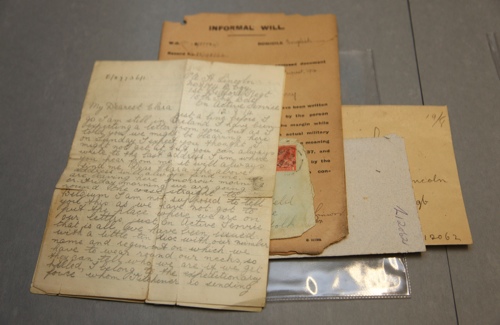Hand-written wills and letters of 230,000 soldiers who fought for Britain and died in the First World War have been forgotten in Government archives for almost a century. The documents have now been revealed on a new website where relatives can see them for the first time.
Some of the wills come with personal letters, hand-written by soldiers who thought they would never return home and which never arrived to their loved ones.
Among the wills found in the archives are those of Albert Butler, a professional footballer who died on May 3, 1916. He wrote: ‘In the event of my death I leave all my property […] to my wife Mrs Kate Butler.’ The will was dated 9.11.15, less than a year before he died.
George Peachment from Bury wrote: ‘In the event of my death I give the whole of my property and my effects to my mother.’ He also died in the war, the Mail Online reports.
In another letter, Private Joseph Witchburn of 2nd Battalion The Durham Light Infantry tells his mother that that would be the last letter from him until the war is over. The letter, dated August 10, 1914 never arrived to Witchburn’s mother and he died on September 14, 1914.
Archivists at Iron Mountain company spent five months going through the letters, scanning them, putting them on a computer and then upload them online. The hand-written documents are now housed by a company on the outskirts of Birmingham, however, the digital scans have been stored in a data centre in Milton Keynes. The same facility holds 41 million wills and other documents dating from 1858.
According to the company’s commercial director, Mr John Apthorpe, some of the letters are very straightforward, while others come with deep personal letters and details about what was going on on the front at that time. He said the reason why the documents have never been released or returned to their beneficiaries was because they belonged to the War Office and the Government.
The small pieces of paper were given to soldiers by their senior officers to be completed before embarking for the war. Although most of the letters and wills have never been witnessed, some of them have been signed by fellow soldiers while they were standing in the trenches.
According to Professor Peter Simkins, the millions of wills present ‘layers of value’. First because relatives can now read the hand-written documents, then there is military value and national value because they bring new information which comes from the soldiers this time and not from the officials. You can tell by their hand-writing if they were educated or not, if they had a family or not, where they lived, how did it feel for them to be there and experience the terrors of the war.
“It has given us the opportunity for the first time to hear the thoughts and emotions of the brave soldiers who died for this country in their own words,” said Courts minister Helen Grant.
